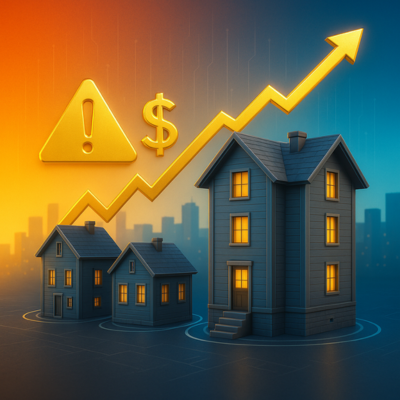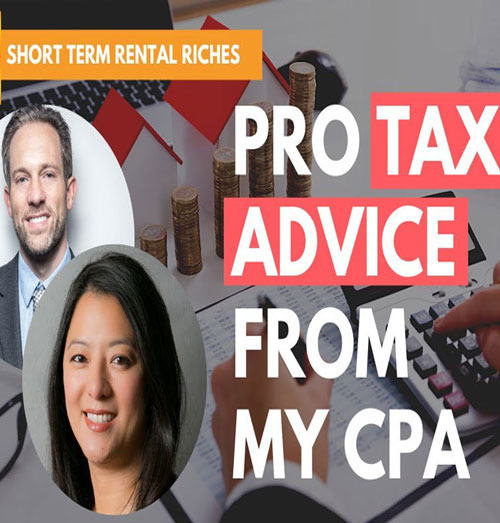Think long-term tenants cause less damage than short-term guests? Think again. In this episode, we dive into surprising data from Tim’s personal portfolio showing how short-term rentals can actually reduce your maintenance costs.
Discover the real numbers, real stories, and real savings that might change your rental strategy forever.
- Why long-term rentals may cost you more in the long run, specially after tenant turnover
- Real-world maintenance savings Tim uncovered over 10+ years of STR operations
- How frequent cleanings and guest stays actually help preserve your property
- The secret power of proactive maintenance in short-term rental success
- What landlords often overlook when calculating true maintenance costs
Short-term rentals aren’t just higher income—they can actually be lower maintenance, too. If you’ve only considered LTRs for their “ease,” this episode may shift your thinking. Want to keep learning? Don’t forget to subscribe, share this with a fellow investor, and check out our helpful resources below.
Resource Links:
Check out our videos on YouTube: https://www.youtube.com/@ShortTermRentalRiches
Grab your free management eBook: https://strriches.com/#tools-resources
Looking to earn more with your property (without the headaches)? Chat with our expert management team: https://strriches.com/management-services/
Which rental strategy actually protects your property more? A short-term rental or a long-term rental.If you’ve been tuning in for a while, then you know that I’ve been at this short-term rental game for a long time, in fact, over 10 years, and I’ve uncovered some really interesting insights in my own personal portfolio.
And one of those, one of the things that I never really expected is that running a short term rental. Can have considerably less maintenance costs than a long-term rental.
So that’s what we’re gonna jump into today. Stay tuned.
I was talking with my housekeeping manager recently. She helps me manage all of our housekeepers across the cities where I have my personal portfolio, and she mentioned something that just blew my mind the other day. She said, Tim. What do you think about us? Repainting number one in Sacramento.
Sacramento is where I started my short-term rental journey. Over a decade ago, I converted this fourplex into short-term rentals, and I haven’t looked back since. It’s been really, really good. But the crazy thing is when she asked me that, it just dawned on me that we haven’t painted this property.
In over a decade yet we have really good reviews and the property still looks really nice.
Now I also own a lot of long-term rentals and I have long-term tenants in my properties that don’t really make a good fit as a short-term rental.
And I know that with all of those, all of those long-term rentals, they have all been painted probably multiple times within the last 10 years. Now, if you’re out there and you’ve had a tenant for over 10 years in one of your long-term rentals, well congrats to you. That’s awesome. I’m not sure what the inside of your property looks like, but at least you’ve been fully occupied.
So let’s just jump right into it. Why exactly do we have less wear and tear with our short-term rentals? .
Well, the first thing is their short-term rentals, meaning their short-term stays, meaning we’re in those properties much more often than we would be in a long-term rental unit.
In other words, they get checked on much more frequently. They get cleaned regularly, including deep cleans.
We’re able to catch maintenance issues before they turn into a big issue.
When we take a reservation from one of our short-term rental guests, we also have a lot of policies in place to help us prevent damage. Right? So you definitely should have a deposit depending on where you’re listing your property. But let’s say you’re on Airbnb and you’re not collecting a deposit, well, you have a lot of protection there as well, right? With their air cover policy. Now I know our team, anytime we have any sort of issue, we’re now managing properties in over two dozen cities , around the nation in multiple countries.
And so we have a lot of experience and we have a lot of experience filing resolutions, and we usually have a really good outcome if there’s any sort of minute or little damage in the property, we’re typically getting reimbursed for that.
So there is, there’s just less wear and tear on our short-term rentals. I know it sounds counterintuitive, but we’re gonna break into some actual numbers in a great example. Of how this difference in maintenance costs really adds up. And there’s some things I’m sure you’re leaving out of your long-term rental maintenance equation, so stay tuned.
We’re gonna jump into that in a second.
But a couple things. First, I don’t know about you, but yes, inflation. Has really taken a toll on the whole world, and along with inflation costs for maintaining, our properties have gone up and costs to turn our long-term rentals or paint them or patch holes in the wall.
Those costs have all gone up significantly, and so depending on the size of your property. This could be a really big expense that we have at one point in time, right? If a guest checks out after one year and we have to turn the whole property, well that’s really expensive, versus a short-term rental guest checking out, maybe they accidentally broke a lamp, which we ultimately charge them for anyways.
One of my most recent apartment turns cost me almost $4,000. And there’s nothing really fancy going on here. You know, it’s, it’s paint, but we gotta remember if it’s a long-term rental, people move in there, they make it their home, and they put shelves in the wall. They hang art and, and all of that stuff has to be patched and taken care of before the next tenant can move in.
So it can add up really quickly. I remember when I was purchasing some condos, these were almost brand new at the time. I mean this was, it was probably like seven years ago and they were built in 2008, so maybe they were like 10 or 15 years old, and part of my inspections was to check out all the units in this.
Actually, it was, it was a condo building. There were eight different units, and one of them, it had this leak on the third floor. So these were town homes that had the garage on the first floor, the living room, and everything on the second floor. And then the bedrooms were on the third floor. And so there was this leak coming out of an AC unit, I think in the attic, which was actually above the third floor.
And it had been there for who knows how long. And this little leak from the AC. Ruined all of the siding all the way down each of those three floors. The insulation inside of it, there was mold simply because no one saw this. The tenant that was living there, I guess, was okay with it. I mean, it was, it was kind of a disaster.
But we know people move into our long-term rentals and maybe we don’t see them for a really long time. So those little sort of maintenance things can turn into big maintenance costs if you don’t catch ’em early.
All right, so those are some of the, the main points. Again, we’re gonna break down an example with actual numbers.
But before we do, let’s get to the second point about short-term rentals, and that is that. It’s in our best interest to always maintain the property, right? We have to have hotel-like standards because our guests are staying at our property versus a hotel. And so you could say that we’re, we’re on a bit of an forced maintenance program where we might not be inspecting our long-term rental as often as we should.
Maybe we’re skipping out on those HVAC routine cleanings or maybe we haven’t been getting pest inspections because it doesn’t really bother the tenant there. But we know guests do not like pests, right? That is a sure way to get a negative review, and so is deferred maintenance.
And so if you’re operating a successful short-term rental, you’re forced to have good maintenance. You’re forced to be proactive. Otherwise, you wouldn’t be doing the short term rental. You wouldn’t be making a lot of money because rear reviews wouldn’t be that great. Your visibility would be much lower on Airbnb and all these different platforms, and no one would book your property.
One other little side note here. We know if we’re comparing a short-term rental and a long-term rental, that our short-term guests don’t have tenant rights, whereas our long-term tenants do.
And there’s a whole bunch of stuff that can go with that. It depends on which state you have your. Long-term rentals in, but California, where I’m from originally, for example, I know that someone can stay in one of my properties out there as a long-term tenant, and if they really know how to play the system, they can stay in my property for up to six months without paying rent.
Keep that in mind. Okay. Let’s go ahead and just jump into a real world example.
If you’re catching the audio only version, we will. If you’re catching the audio only version, you can find us on YouTube at short-term rental riches. I’m sharing a spreadsheet right now.
I’ll try to just give you the highlights here so I don’t lose you. And ultimately we’re gonna uncover the difference between the maintenance cost for a property over a 10 year period.
So here we are in an example. This is a long-term rental versus a short-term rental. Now in this spreadsheet I’m actually breaking down what the overall return would be between a long-term and a short-term rental, but that’s gonna get into a few too many numbers.
And so if you’d like me to do a video or an episode on that separately, leave a comment down below and I’d be happy to do that.
For the purposes of this episode we’re gonna focus just on maintenance, and so in both situations, we’re looking at the same property. Here I have an 8% maintenance cost of gross revenue. What does that mean? That means if I have a hundred thousand dollars in revenue, that I’m expecting this property to have about $8,000 in maintenance per year. Now, that might sound like an awful lot, and it is depending on the type of property you have.
Now, this property, this example, is an older property. So it has some things that are going out more commonly, like hot water heaters or roof leaks, or you know, you name it. Older properties are gonna have more maintenance. So I have 8% on the gross revenue on a long-term side, and then also on a short-term rental side.
in my short-term rental side, I’m earning much more short-term rental revenue, so 352,000, meaning I’m gonna have more maintenance costs, I put in the same 8% that comes to 28,000 on the long-term rental side. If I was to switch this back to a long-term rental, I’m thinking it could probably make 187008% of that as a maintenance cost.
Would be 14,000, almost $15,000. And so right now you might be thinking, well, that doesn’t make sense, Tim, him the short term rental has more maintenance. But this is where the difference comes in. We know that our tenants are going to move out at some point in time. In fact, if this happens to be an apartment, then the amount of times that they’re moving out can usually be a lot more.
If it’s a home, that average tenancy is a little longer. Maybe it’s two or three years. But for the purposes of this, I’m saying that the average tenancy’s about a year and a half. And so if we look at that turnover cost, and in here I have a $4,000 cost to turn over that property, so paint, texture, whatever you need to do. Now, if that’s happening every year and a half.
With this particular property that happens to have 12 units. Then there’s a $24,000 apartment turn cost here. So if we add up all the maintenance for this property as a long-term rental, that 8% plus those turnover costs, those average turnover costs, then in the first year, I’m paying around 38, almost $40,000 in maintenance.
Now if we jump over to the short-term rental side that has more maintenance costs in here, remember I kept that same 8%, but it has zero apartment turn because we don’t have to do those big turns, and the difference actually ends up being 28% less maintenance costs in the first year.
Now, if we break that out over 3, 5, 10 years in a 10 year period with everything I have here. This short term rental, is paying $107,000 less in maintenance.
I hope that gave you just a little bit of insight. And again, this isn’t to say that this property makes more sense as a short-term rental. It could make more sense as a long-term rental, but we have to plug in a lot of different numbers for that, right? We have to know our supply costs. We have to know our utility costs.
We have to know quite a bit of other things too much for this video. So again, if you’d like me to jump into that comparison, I’d be happy to do that. Again, if you’d like me to do that, just leave some comments below. I’ll work on getting another episode out.
Again, this isn’t comparing whether or not you should operate a property as a short-term rental or a long-term rental. We know you have to buy furniture if it’s a short-term rental, you have supply costs. Uh, and there’s quite a few other things that go into that calculation.
And the example I just showed, it certainly made more sense to operate as a short-term rental, but I’d be happy to do a full nother video on that. Just breaking down actually how you compare the two over a longer time horizon. Just leave some comments below if you want me to do that, I’d be happy to.
Wrapping up here, we know that our short-term rentals are going to have maintenance. There’s also a few things that we can do to minimize the cost and minimize the downtime for the property. That’s really the big thing with our short-term rentals, is we don’t want to have vacant nights, and if we’re blocking the calendar because of maintenance.
Then we’re gonna have lower income. So make sure that you’re planning your maintenance or any maintenance that you actually need to do on days that are out of season, if you can, if you have that luxury. Also days during the week maybe versus days on the weekend.
Check for gaps in your calendar. Schedule this stuff proactively. Of course, if there’s a maintenance issue that’s going to bother your guests, well, you’re gonna have to block the calendar and you gotta get that fixed right away.
So in a nutshell, our short-term rentals aren’t just earning us more per year. But in many cases, they have far less maintenance costs, physical maintenance costs to our property than they would as a long-term rental. I hope that example, showing you that I potentially am gonna save over six digits, over a hundred thousand dollars with this property over the course of the next 10 years, gave you a little bit more insight.
So I hope you found that insightful, and this isn’t to say that you’re not gonna have maintenance items in your short-term rental, right. We did an episode way back 129 that talked about some maintenance items that you will have for sure, and so if you miss that, you can head back to our website, st riches.com.
Check that out. Until next time, I hope you have a fabulous week.















